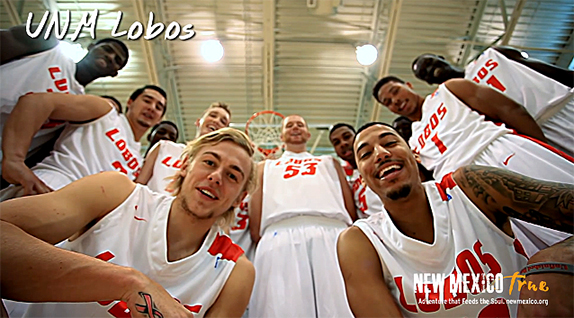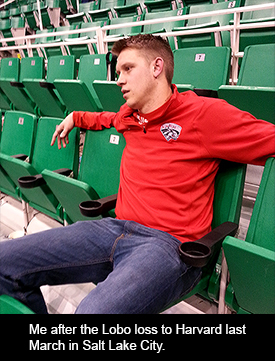
Dear Lobo Fans,
 In the first week of February 2013, the 19-3 Lobos ranked 15th nationally on their way to a 29-win season and a three seed in West Region. Six weeks later sitting stunned in Section 19 of Salt Lake’s EnergySolutions Arena, I would have traded all those accolades for a rematch with Harvard.
In the first week of February 2013, the 19-3 Lobos ranked 15th nationally on their way to a 29-win season and a three seed in West Region. Six weeks later sitting stunned in Section 19 of Salt Lake’s EnergySolutions Arena, I would have traded all those accolades for a rematch with Harvard.
This February, the 17-4 Lobos look in from outside the Top-25. While on track for an NCAA appearance, two bad losses--one to stumbling NMSU and another to underperforming UNLV--keep the Lobos from receiving national attention. Coming on the radar this week, the downward spiral of UMass may turn another loss into a blemish on the Lobos’ March resume. While the Lobos only have one more loss than this week last season, the 2013-14 Lobos have not shown the dominance or conjured up the excitement of last year team. What’s the difference?
Jamal Fenton.
To most Lobo fans, this proposition sounds ludicrous, but Tony Snell, the obvious difference between the two teams, has been replaced.
During the 2012-13 season, Snell averaged 12.5 points, 2.6 rebounds, 2.9 assists, .8 steals, and .5 blocks per games. His long, athletic frame coupled with a defensive ethic shut down opponents, and he posted some of his best performances in big games, hence the Mountain West Tournament Most Valuable Player.
From last season to this season, the four returning starters--Hugh Greenwood, Kendall Williams, Alex Kirk, and Cameron Bairstow--collectively improved their statistical output in all five offensive categories. Together their per game averages improved +16 points, +2 rebound, +1.9 assists, +.3 steals, and +1.5 blocks. With the exception of half a rebound, half a steal, and one assist, Snell’s statistical shoes have been filled by the four returning starters, and the Lobos still have room for a fifth player on the court.
Whether it be Deshawn Delaney or Cleveland Thomas, who started 11 and 10 games respectively, the fifth Lobo offers a long, athletic frame who can guard similar players as Snell and pitch in as a role player on the offensive end.
Of course, the Lobos would be a better team if Snell returned to play his senior season. He’s making an impact from the bench on the depleted, but playoff-bound, Chicago Bulls. A player of Snell's caliber would benefit the Lobos--and nearly any other team in college basketball--but this year’s team does not reveal a clear deficiency that he would rectify.
This year’s Lobos, however, would benefit from a quick, scrappy ball handler who has the potential to make big shots. Enter Jamal Fenton. Last season, Fenton provided the intangible. When the Lobos seemed lackluster and stumbling in second halves, Fenton came off the bench to provide a defensive stop, a fast-break bucket, or a clutch fall-away jumper. He singled-handedly cranked up The Pit’s volume to rock-concert levels, and, on the road, Fenton gave the Lobos the stroke of confidence they needed.
Even last March in Salt Lake, I thought Fenton was going to be the difference. He hit a three pointer with 7:55 left in the game to put the Lobos up 49-47, giving them their first lead against Harvard. I remember saying, “Alright, here we go. That’s what the Lobos needed.”
As we know, it wasn’t enough.
This year the Lobos have struggled defending smaller guards in their losses. All 5’9” of UMass guard Chaz Williams scored 19 points against the Lobos. NMSU’s 6’1” K.C. Ross-Miller put up 16 points in The Pit, and UNLV’s 6-foot-nothing Deville Smith pitched in 17 points to help the Runnin’ Rebels hold on to their victory. Each performance outpaced the player’s scoring average and came in first or second on his team’s total points column. Fenton would have limited all three shorter opponents.
With Snell declaring for the draft, Fenton graduating, and Steve Alford gone, the 2013-14 Lobos do not seem to have the bracket-busting potential that last year’s team did, but these Lobos will go deeper into the NCAA Tournament.
If the Lobos make it to March healthy, they will be a formidable foe for anyone. The Lobos may not win the Mountain West Tournament with a determined SDSU or desperate UNLV at home, but Coach Craig Neal is pacing the Lobos to be post-season contenders.
A healthy Greenwood continues to improve after his holiday absence. Kirk’s return takes pressure off Bairstow offensively; Kirk will provide a defensive presence, and his jumper will begin to fall. The Lobos are playing loose this year. Rubbing off Coach Neal, the team’s swagger contrasts to the tight, poor-shooting team we saw in Salt Lake.
The NCAA Tournament is about match-ups. While the Lobos’ deficiency of a quick, small guard has been exposed, the Lobos present match-up problems for nearly every front court in the country. National-powerhouse Kansas attempted to neutralize the Lobo bigs by driving at them early in an attempt to cause foul trouble--poor officiating accelerated Kirk finding the bench. Even though the Jayhawks start 7-foot Joel Embiid and 6’8” Perry Ellis, Coach Bill Self knew the Lobos presented a challenge with two elite posts on the floor.
With a week of preparation between the Conference playoff and the NCAA Tournament, Coach Neal will game plan to contain a small guard and use the posts effectively. Look for a Lobo victory in the round of 64, and, then, an experienced, determined core of four will try to take the Lobos where they have never gone before--and, maybe, just maybe, if everything goes right, our road will go through UCLA.
Go Lobos!
Yours in Section K
P.S. “Richard Sherman is classless.”
I read it minutes after his now-infamous, post-game interview, and, after two weeks of commentary, it remains the best analysis of the situation--not about Sherman, but about the public reaction. Emphatically calling Michael Crabtree “mediocre,” Sherman did not violate a public sensibility of decency; he violated the social expectations of his class, a player. Sherman knew an academic account of his final play was expected in the interview, but, instead, he brought censored, in-game “trash talk” into living rooms across the United States.
In the Roman Colosseum, gladiators faced similar classist demands. At the end of a fight, the crowd shouted for the emperor, or other presiding politician, to order the death or mercy of a competitor. If a specific gladiator defied the expectations of his caste, by let’s say shouting at the crowd or emperor, his fate was sealed. The uproar directed at Sherman demands an eerily similar censure.
Now instead of talking about what happened at the Super Bowl, let’s talk about who was there. Parking problems at the Super Bowl are for private-jets, not cars, and the average price of a ticket settled at $1,767 on Friday. The Super Bowl is a class-exclusive event. So while some demand Sherman “learn some class,” we should ask ourselves why we pay so much attention to how he conducts himself while we remain oblivious to our classist tendencies--listening to misogynistic comments without saying anything, distancing ourselves from the person at work who spoke up against authority, or censuring a child who asked why.
While this postscript may seem like a digression from college basketball, it’s not. As fans, we internalize and promote classist biases all the time. We accept that six-figure-salaried coaches scream in an amateur’s face, but, if roles were reversed, we’d disapproving immediately. We expect college players to conduct themselves as professionals even though they are teenagers or in their early twenties--a period we all made mistakes. And we allow public institutions to make millions of dollars--last year Louisville cleared $24.6 million in profit from its basketball program--using often poor, black people as entertainment in exchange for a “free education.”



Responses to “From Section K: Lobos Better Last Year, But This Squad Will Go Further”